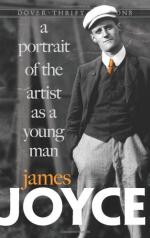This spirit of quarrelsome comradeship which he had observed lately in his rival had not seduced Stephen from his habits of quiet obedience. He mistrusted the turbulence and doubted the sincerity of such comradeship which seemed to him a sorry anticipation of manhood. The question of honour here raised was, like all such questions, trivial to him. While his mind had been pursuing its intangible phantoms and turning in irresolution from such pursuit he had heard about him the constant voices of his father and of his masters, urging him to be a gentleman above all things and urging him to be a good catholic above all things. These voices had now come to be hollow-sounding in his ears. When the gymnasium had been opened he had heard another voice urging him to be strong and manly and healthy and when the movement towards national revival had begun to be felt in the college yet another voice had bidden him be true to his country and help to raise up her language and tradition. In the profane world, as he foresaw, a worldly voice would bid him raise up his father’s fallen state by his labours and, meanwhile, the voice of his school comrades urged him to be a decent fellow, to shield others from blame or to beg them off and to do his best to get free days for the school. And it was the din of all these hollow-sounding voices that made him halt irresolutely in the pursuit of phantoms. He gave them ear only for a time but he was happy only when he was far from them, beyond their call, alone or in the company of phantasmal comrades.
In the vestry a plump fresh-faced jesuit and an elderly man, in shabby blue clothes, were dabbling in a case of paints and chalks. The boys who had been painted walked about or stood still awkwardly, touching their faces in a gingerly fashion with their furtive fingertips. In the middle of the vestry a young jesuit, who was then on a visit to the college, stood rocking himself rhythmically from the tips of his toes to his heels and back again, his hands thrust well forward into his side-pockets. His small head set off with glossy red curls and his newly shaven face agreed well with the spotless decency of his soutane and with his spotless shoes.
As he watched this swaying form and tried to read for himself the legend of the priest’s mocking smile there came into Stephen’s memory a saying which he had heard from his father before he had been sent to Clongowes, that you could always tell a jesuit by the style of his clothes. At the same moment he thought he saw a likeness between his father’s mind and that of this smiling well-dressed priest: and he was aware of some desecration of the priest’s office or of the vestry itself whose silence was now routed by loud talk and joking and its air pungent with the smells of the gas-jets and the grease.




